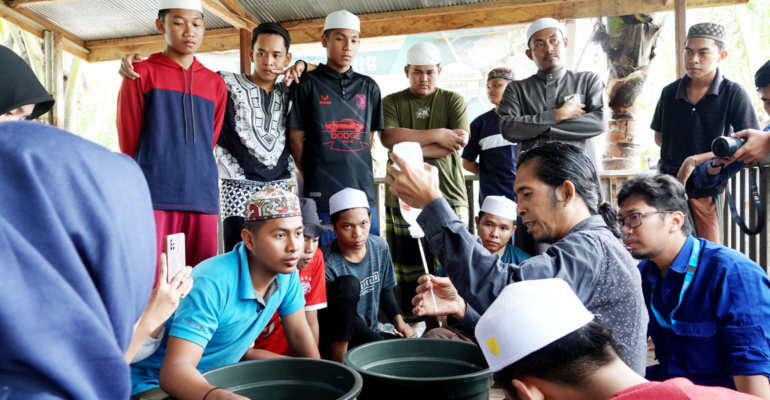IPB University OVOC Team Provides Assistance in Improving Feed Quality and Spawning Local Kalimantan Fish

The One Village One CEO (OVOC) team of IPB University students has held a papuyu fish spawning assistance program for students at Pondok Pesantren Nurul Muhibbin Halong, Balangan Regency, South Kalimantan. The assistance was carried out to increase the knowledge capacity of the fisheries working group at the boarding school.
Papuyu fish is one of the local fish species typical of South Kalimantan which is commonly found in swamp waters for consumption as a side dish. In the process, the OVOC team of IPB University students was also accompanied by experts.
The experts involved include Fajar Maulana, SPi, MSi (Lecturer at the Faculty of Fisheries and Marine Science, IPB University) and Rahmat Hidayat, SPi, MSi (Fisheries Research Center, Earth and Maritime Research Organization, National Research and Innovation Agency).
Not only that, the working groups were also equipped with knowledge on how to check water quality by Dr Rini Marlida, a lecturer at Achmad Yani University Banjarmasin.
This activity is a collaboration between the Adaro Foundation and IPB University in the Kedaireka Matching Fund program. The training was attended by 14 fisheries working group students and attended by 4 people from the Adaro Foundation Bangun Negeri (YABN) team.
The training began with a presentation by Fajar Maulana on the introduction of growth hormones and bio organisms that can help filtration in fish ponds. After that, it continued with the practice of spawning papuyu fish. Spawning is carried out in a bucket with a semi-natural method, namely by adding hormones injected through the back of the fish.
“The ratio used in papuyu spawning is 1 female:4 males. This is because females have a greater weight than males. Tomorrow the eggs will surface, the day after tomorrow the eggs can hatch,” said Rahmat, the expert team who assisted with the training activities.
The working group was very enthusiastic to follow and see the process of injecting hormones into papuyu fish. They were also allowed to directly try the injection process.
“I am new to this spawning technique with hormone injection, so I don’t want to miss any of the material and practical sessions. I also had the opportunity to practice directly during the process. So I can feel it and will be more confident in the future that I can apply it too,” said Doni, one of the working group members.
After spawning was completed, the practice continued with making quality feed with the addition of growth hormones and checking the quality of the pond water. With this training, it is hoped that the students can improve their understanding of fish farming and maintain the quality of fish during production.
“The existence of this training is expected that the students not only learn religion but also learn in the business world, one of which is in the field of fisheries so that after the students graduate, they have got the provision of entrepreneurship,” said Ustaz Amin as the head of the Fisheries Working Group of Ponpes Nurul Muhibbin Halong. (*/Rz) (IAAS/TNY)



